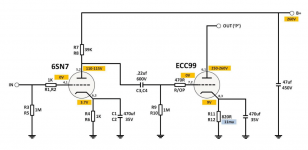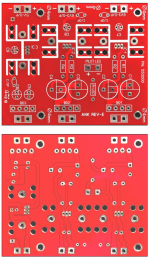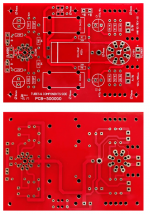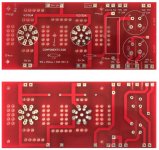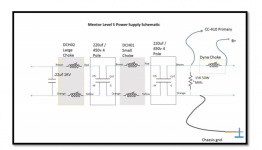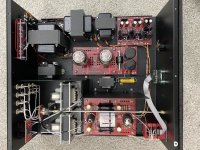Hello all, I recently finished building a preamp kit from ANK but I had some noise (sounds very much like white noise) from it. I have checked all my steps/wiring and have confirmed these with Brian from ANK including all voltage measurements. So I would assume I built it correctly at least...
Here are my findings:
1. When I shorted the grid of 6SN7 to ground, the noise did not change. DC and AC voltage here to ground is 0V.
2. When I shorted the grid of ecc99 to ground, the noise disappeared. DC and AC voltage here to ground is 0.1-0.2V.
3. The noise appears after the preamp is on about 10 seconds.
4. The noise disappears after the preamp is off after 15-20 seconds.
5. It does not sound like hum or buzz, very much like white noise (something below 2kHz I would assume).
6. Both channels have the same amount/type of noise.
7. All the results above are tested with shorted inputs and I have done 1/2 on both channels. Noise disappears only at one channel at a time.
8. I tried more than three equivalent sets of tubes for each position, including ecc99, 6sn7, 5u4g. The noise does not change at all..
9. The noise does not change by the time it is tested. Actually it was tested in a room free of electronics and wifi even...
So I would assume the noise came from 6SN7. Then I tried some different tubes equivalent to 6SN7, the noise didn't change at all. In this case, maybe the noise comes from B+ or filament? Since other people who have built this kit have no hum/buzz/noise issues at all, I don't think it has grounding/design issues that caused my problem. Maybe it is a bad component, like a bad cap, a bad choke, etc. I need to find out which one is the bad guy...
If you have any thoughts, please let me know. I currently have a cheap scope bought from amazon, but it does not help much. When I shorted the grid of ECC99, I hear no noise. However, the scope shows no difference compared to not shorting anything and has noise.
Thank you guys very much! Here are some info about my preamp.
Here are my findings:
1. When I shorted the grid of 6SN7 to ground, the noise did not change. DC and AC voltage here to ground is 0V.
2. When I shorted the grid of ecc99 to ground, the noise disappeared. DC and AC voltage here to ground is 0.1-0.2V.
3. The noise appears after the preamp is on about 10 seconds.
4. The noise disappears after the preamp is off after 15-20 seconds.
5. It does not sound like hum or buzz, very much like white noise (something below 2kHz I would assume).
6. Both channels have the same amount/type of noise.
7. All the results above are tested with shorted inputs and I have done 1/2 on both channels. Noise disappears only at one channel at a time.
8. I tried more than three equivalent sets of tubes for each position, including ecc99, 6sn7, 5u4g. The noise does not change at all..
9. The noise does not change by the time it is tested. Actually it was tested in a room free of electronics and wifi even...
So I would assume the noise came from 6SN7. Then I tried some different tubes equivalent to 6SN7, the noise didn't change at all. In this case, maybe the noise comes from B+ or filament? Since other people who have built this kit have no hum/buzz/noise issues at all, I don't think it has grounding/design issues that caused my problem. Maybe it is a bad component, like a bad cap, a bad choke, etc. I need to find out which one is the bad guy...
If you have any thoughts, please let me know. I currently have a cheap scope bought from amazon, but it does not help much. When I shorted the grid of ECC99, I hear no noise. However, the scope shows no difference compared to not shorting anything and has noise.
Thank you guys very much! Here are some info about my preamp.
Attachments
Last edited:
If this happens with shorted inputs as well, then it must be a part or connection. Try replacing in this order
(one at a time) 39k, 1k cathode, 1k grid. If one of these does not fix the problem, clean the tube socket,
and look over all the solder joints carefully. Check the cathode capacitor polarity while you're at it.
You could also poke around with an insulated tool (pencil eraser, etc.). If all else fails, try swapping the
coupling capacitors C3/4 between channels, but that's rather unlikely. Is the pcb clean and free of rosin?
(one at a time) 39k, 1k cathode, 1k grid. If one of these does not fix the problem, clean the tube socket,
and look over all the solder joints carefully. Check the cathode capacitor polarity while you're at it.
You could also poke around with an insulated tool (pencil eraser, etc.). If all else fails, try swapping the
coupling capacitors C3/4 between channels, but that's rather unlikely. Is the pcb clean and free of rosin?
Last edited:
Try reducing the both grid (1M to 100-220k) and remove the 470uF cap of the 6sn7 to reduce gain it could reduce the noise to aceptable levels if the noise is related with the ground layout, also the 1M resistor can be a little high for both triodes
Yes, all the results above happened with shorted inputs and both channels..
Those cathode caps are non-polarized (AN Kaisei)..
Ok, I am gonna try replacing these resistors and see. However, the noise comes from both channels--I don't know if a broken component in one channel can also cause noise to another channel (I don't think two components on the same positions are broken at the same time...). Anyway, thank you very much!
Those cathode caps are non-polarized (AN Kaisei)..
Ok, I am gonna try replacing these resistors and see. However, the noise comes from both channels--I don't know if a broken component in one channel can also cause noise to another channel (I don't think two components on the same positions are broken at the same time...). Anyway, thank you very much!
If this happens with shorted inputs as well, then it must be a part or connection. Try replacing in this order
(one at a time) 39k, 1k cathode, 1k grid. If one of these does not fix the problem, clean the tube socket,
and look over all the solder joints carefully. Check the cathode capacitor polarity while you're at it.
You could also poke around with an insulated tool (pencil eraser, etc.). If all else fails, try swapping the
coupling capacitors C3/4 between channels, but that's rather unlikely. Is the pcb clean and free of rosin?
Yes, this happened with shorted inputs as well. All the solder joints should be solid. I have tried to fix it for over two months, joints are the ones I looked over and over. these cathode capacitors are non-polarized (so called AN Kaisei).
The PCB is fairly clean, but not free of rosin. I used solder made from Mundorf, it contains things like rosin I suppose. But this PCB is not very compact, I don't know if it is gonna cause the problem...
If the noise is in both channels, that means it's more likely to be in the power supply,
although there's a rather small chance it's both of the 39k resistors. Is the noise at a low level?
It could be normal for the circuit/gain/tube type. All circuits have a certain normal residual noise level.
Your system could have more gain, or higher efficiency speakers, than typical.
Can you try a lab power supply instead? Could it be interference picked up from the mains?
Is there a nearby digital component running, etc? Turn off some equipment in the area.
Light dimmers used to generate electrical noise. Try checking the noise level at a different time of day.
although there's a rather small chance it's both of the 39k resistors. Is the noise at a low level?
It could be normal for the circuit/gain/tube type. All circuits have a certain normal residual noise level.
Your system could have more gain, or higher efficiency speakers, than typical.
Can you try a lab power supply instead? Could it be interference picked up from the mains?
Is there a nearby digital component running, etc? Turn off some equipment in the area.
Light dimmers used to generate electrical noise. Try checking the noise level at a different time of day.
Last edited:
Try reducing the both grid (1M to 100-220k) and remove the 470uF cap of the 6sn7 to reduce gain it could reduce the noise to aceptable levels if the noise is related with the ground layout, also the 1M resistor can be a little high for both triodes
Yes, I want to try to reduce the gain as well! But the problem is that others who built the exact same one have no such noise issue...🙁 I really would like to solve it before I modifier the circuit..
I don't have a lab supply...
The noise does not change by the time it is tested.
Other people who have built the exact same preamp have no noise at all... and I have more than 3 sets of tubes for each position, changing tubes does not change the noise at all.. The noise is like white noise but lower a bit. I would guess something from 50-2000 Hz..
The noise does not change by the time it is tested.
Other people who have built the exact same preamp have no noise at all... and I have more than 3 sets of tubes for each position, changing tubes does not change the noise at all.. The noise is like white noise but lower a bit. I would guess something from 50-2000 Hz..
You did not say if you used a DMM or VOM to test the resistors.
Every resistor in the schematic can be tested easily, with the tubes in place.
Suppose the 6SN7 grid leak resistor and grid stopper resistor position were swapped.
Suppose the 6SN7 grid stopper is 1 ohm instead of 1k.
Etc.
You did not comment if the preamp passes signal properly.
Did you test that?
“Those who do not know history, are not aware that Deja Vu is biting them”
Every resistor in the schematic can be tested easily, with the tubes in place.
Suppose the 6SN7 grid leak resistor and grid stopper resistor position were swapped.
Suppose the 6SN7 grid stopper is 1 ohm instead of 1k.
Etc.
You did not comment if the preamp passes signal properly.
Did you test that?
“Those who do not know history, are not aware that Deja Vu is biting them”
The noise is like white noise but lower a bit. I would guess something from 50-2000 Hz..
What is the amplifier gain, and the speaker efficiency?
Sorry about that, I just started doing DIY so I didn't pay attention to the details. I use a DMM (Mastech MS8268) to test resistors, voltage, etc..You did not say if you used a DMM or VOM to test the resistors.
Every resistor in the schematic can be tested easily, with the tubes in place.
Suppose the 6SN7 grid leak resistor and grid stopper resistor position were swapped.
Suppose the 6SN7 grid stopper is 1 ohm instead of 1k.
Etc.
You did not comment if the preamp passes signal properly.
Did you test that?
“Those who do not know history, are not aware that Deja Vu is biting them”
I am not sure if my preamp passes signal "properly" or not, but it sings in the system. It sounds pretty good except it has annoy noise when the music is quiet even 6 feet away from the speakers..
I use a 300B amp, 300B are only driven by 6SH7s (also from ANK). I didn't find any info about the gain for this amp on their website, but it shouldn't be a lot...
My speakers are a pair of cube audio F8 (full range), 93dB according to their website.
My speakers are a pair of cube audio F8 (full range), 93dB according to their website.
The unregulated supply will provide hum, but no noise. I suspect the 39k anode resistor. Once I had a noisy AC-30 guitar amp on the bench and after replacing its low quality carbon anode resistors the noise was gone. Do use metal-film instead of carbon at this position.
Put some 100nF~1uF capacitor parallel to this anode resistor.
If noise is gone - replace resistor.
Otherwise it is your supply and you need a decoupling RC-lowpass between V+ and the anode resistor.
Put some 100nF~1uF capacitor parallel to this anode resistor.
If noise is gone - replace resistor.
Otherwise it is your supply and you need a decoupling RC-lowpass between V+ and the anode resistor.
Last edited:
The unregulated supply will provide hum, but no noise. I suspect the 39k anode resistor. Once I had a noisy AC-30 guitar amp on the bench and after replacing its low quality carbon anode resistors the noise was gone. Do use metal-film instead of carbon at this position.
Put some 100nF~1uF capacitor parallel to this anode resistor.
If noise is gone - replace resistor.
Otherwise it is your supply and you need a decoupling RC-lowpass between V+ and the anode resistor.
These 39k resistors are branded Audio Note, so called tantalum non-magnetic resistors.. Should be very high quality, but it does the possibility that they are not a good fit at this position? I will try using some caps as you said, hopefully that works. Additionally, would you mind explain a little bit more about how I am gonna add a decoupling RC-lowpass? Thank you very much!
My speakers are a pair of cube audio F8 (full range), 93dB according to their website.
This could well be the problem, too much system gain. I would try adding an input attenuator inside
the power amplifier, perhaps 10dB or even more. Or don't use the preamp's active circuitry at all,
just the input switching and volume control. Where exactly in your system is the main volume control?
If you have a source with its own volume control, try running it directly into the power amplifier.
I'll bet that you will still have all the gain that you need, without the noise. That would mean
you don't need a line stage with gain. I believe your current line stage has over 20dB gain,
plus the speakers are very efficient.
Last edited:
the manufacturer site does not offer any sort of technical data but loads auf audiofoolish mumbo jumbo. 😡These 39k resistors are branded Audio Note, so called tantalum non-magnetic resistors.. -lowpass? Thank you very much!
the most simple test: Remove first tube from socket - what happens?
The noise disappeared
This could well be the problem, too much system gain. I would try adding an input attenuator inside
the power amplifier, perhaps 10dB or even more. Or don't use the preamp's active circuitry at all,
just the input switching and volume control. Where exactly in your system is the main volume control?
If you have a source with its own volume control, try running it directly into the power amplifier.
I'll bet that you will still have all the gain that you need. That would mean you don't need
a line stage with gain. I believe your current line stage has over 20dB gain, plus the speakers
are very efficient.
The volume pot is before the input of preamp's line stage. My source has its own volume control but does not sound really good while directly driving my amp.. I think it is because this amp was not designed as an integrated amp so I got a preamp for it--and it does make it sound much better except the noise making me crazy...
Thus it is not your power supply and you do not need the proposed filter. What happens if you disconnect the first cathode capacitor?The noise disappeared
- Home
- Amplifiers
- Tubes / Valves
- Preamp Noise Issue
